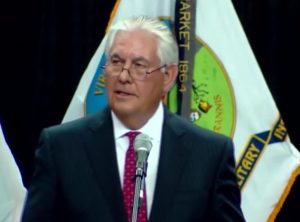
Tillerson’s words come across as wise and measured. He speaks of technology, of the need for truth, and for the protection of freedom of speech. He also speaks of globalisation and the changes it is bringing.
The crux of his comments on truth is the much-quoted phrase “you will know the truth, and the truth will set you free”. But that quote comes from St John’s gospel. It is both a statement on freedom, and something deeply rooted in the Christian heritage of the West.
Tillerson goes on to talk about “allies who share our values” and others. Inadvertently, he highlights one of the key anxieties of globalisation. Freedom and truth are good things. Christianity is also the bedrock of Western society. But, despite the West’s now-complex relationship with its Christian heritage, religion is part of a “double inscription”: on the one hand, it shapes the way we view the world, and our experience of the world shapes our religion. It is extremely hard to step outside this. Even Westerners who reject Christianity tend to get up in the Christianity they are rejecting (or its mirror image).
Yes, there clearly is a problem around post-Truth politics, and the Trump administration is making this worse. But the deeper problem is that globalisation makes it harder to ignore the real differences between societies — and harder to sustain the fantasy that the Western way is necessarily the best (or the triumphant) one.
Perhaps it is those very anxieties that are contributing to the erosion of truth in politics, because truth is becoming harder to grasp and less appealing than comforting fantasies which can take its place.
The West owes a great deal to its Christian roots, but in our time we need to find a way that is both faithful to those roots, and recognises that there are profoundly different ways in which other cultures, with which we need to work, are operating.